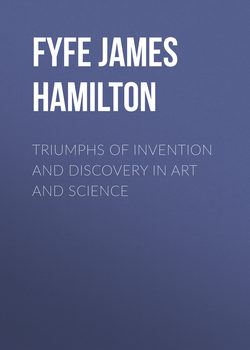Triumphs of Invention and Discovery in Art and Science

Реклама. ООО «ЛитРес», ИНН: 7719571260.
Оглавление
Fyfe James Hamilton. Triumphs of Invention and Discovery in Art and Science
Preface
The Art of Printing
I. – JOHN GUTENBERG
II. – WILLIAM CAXTON
III. – THE PRINTING MACHINE
The Steam Engine
I. – THE MARQUIS OF WORCESTER
II. – JAMES WATT
The Manufacture of Cotton
I. – KAY AND HARGREAVES
II. – SIR RICHARD ARKWRIGHT
III. – SAMUEL CROMPTON
IV. – DR. CARTWRIGHT
V. – SIR ROBERT PEEL
The Railway and the Locomotive
I. – "THE FLYING COACH."
II. – THE STEPHENSONS: FATHER AND SON
III. – THE GROWTH OF RAILWAYS
The Lighthouse
I. – THE EDDYSTONE
II. – THE BELL ROCK
III. – THE SKERRYVORE
Steam Navigation
I. – JAMES SYMINGTON
II. – ROBERT FULTON
III. – HENRY BELL
IV. – OCEAN STEAMERS
Iron Manufacture
HENRY CORT
The Electric Telegraph
I. – MR. COOKE
II. – PROFESSOR WHEATSTONE
III. – THE SUBMARINE TELEGRAPH
The Silk Manufacture
I. – JOHN LOMBE
II. – WILLIAM LEE
III. – JOSEPH MARIE JACQUARD
The Potter's Art
I. – LUCA DELLA ROBBIA
II. – BERNARD PALISSY
III. – JOSIAH WEDGWOOD
The Miner's Safety Lamp
SIR HUMPHREY DAVY
Penny Postage
The Overland Route
LIEUTENANT WAGHORN
Отрывок из книги
Some Dutch writers, inspired by a not unnatural feeling of patriotism, have endeavoured to claim the honour of inventing the Art of Printing for a countryman of their own, Laurence Coster of Haarlem. Their sole reliance, however, is upon the statements of one Hadrian Junius, who was born at Horn, in North Holland, in 1511. About 1575 he wrote a work, entitled "Batavia," in which the account of Coster first appeared. And, as an unimpeachable authority has remarked, almost every succeeding advocate of Coster's pretensions has taken the liberty of altering, amplifying, or contradicting the account of Junius, according as it might suit his own line of argument; but not one of them has succeeded in producing a solitary fact in confirmation of it. The accounts which are given of Coster's discovery by Junius and his successors present many contradictory features. Thus Junius says: "Walking in a neighbouring wood, as citizens are accustomed to do after dinner and on holidays, he began to cut letters of beech-bark, with which, for amusement – the letters being inverted as on a seal – he impressed short sentences on paper for the children of his son-in-law." A later writer, Scriverius, is more imaginative: "Coster," he says, "walking in the wood, picked up a small bough of a beech, or rather of an oak-tree, blown off by the wind; and after amusing himself with cutting some letters on it, wrapped it up in paper, and afterwards laid himself down to sleep. When he awoke, he perceived that the paper, by a shower of rain or some accident having got moist, had received an impression from these letters; which induced him to pursue the accidental discovery."
Not only are these accounts evidently deficient in authenticity, but it should be remarked that the earliest of them was not put before the world until Laurence Coster had been nearly a hundred and fifty years in his grave. The presumed writer of the narrative which first did justice to his memory had been also twelve years dead when his book was published. His information, or rather the information brought forward under cover of his name, was derived from an old man who, when a boy, had heard it from another old man who lived with Coster at the time of the robbery, and who had heard the account of the invention from his master. For, to explain the fact of the early appearance of typography in Germany, the Dutch writers are forced to the hypothesis that an apprentice of Coster's stole all his master's types and utensils, fleeing with them first to Amsterdam, second to Cologne, and lastly to Mentz! The whole story is too improbable to be accepted by any impartial inquirer; and the best authorities are agreed in dismissing the Dutch fiction with the contempt it deserves, and in ascribing to John Gutenberg, of Mentz, the honour to which he is justly entitled.
.....
By the year 1477, Caxton had returned to London, and set up a printing establishment within the precincts of Westminster Abbey; had given to the world the three first books ever printed in England, – "The Game and Play of the Chesse" (March 1474); "A boke of the hoole Lyf of Jason" (1475); and "The Dictes and Notable Wyse Sayenges of the Phylosophers" (1477), – and was fairly started in the great work of supplying printed books to his countrymen, which, as a placard in his largest type sets forth, if any one wanted, "emprynted after the forme of this present lettre whiche ben well and truly correct, late hym come to Westmonster, in to the Almonesrye, at the reed pale, and he shal have them good chepe." From the situation of the first printing office, the term chapel is applied to such establishments to this day.
Caxton published between sixty and seventy different works during the seventeen years of his career as a printer, all of them in what is called black letter, and the bulk of them in English. He had always a view to the improvement of the people in the works he published, and though many of his productions may seem to us to be of an unprofitable kind, it is clear that in the issue of chivalrous narratives, and of Chaucer's poems (to whom, says the old printer, "ought to be given great laud and praising for his noble making and writing"), he was aiming at the diffusion of a nobler spirit, and a higher taste than then prevailed.
.....